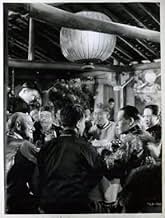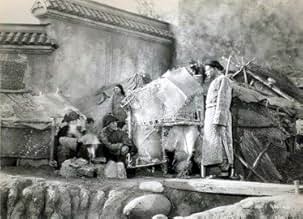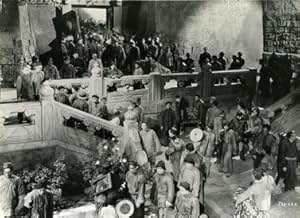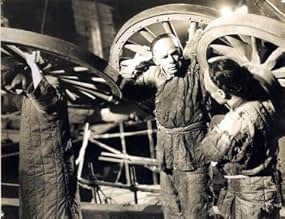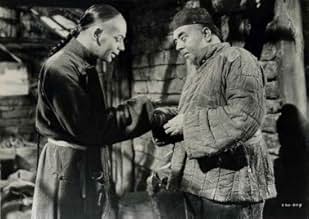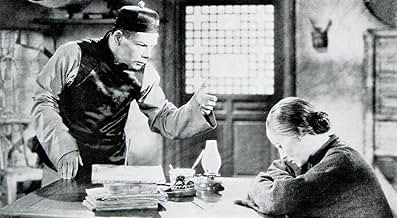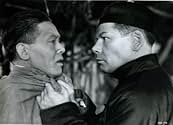Adicionar um enredo no seu idiomaAlthough married Chinese farmers Wang and O-Lan initially experience success, their lives are complicated by declining fortunes and lean times, as well as the arrival of the beautiful young ... Ler tudoAlthough married Chinese farmers Wang and O-Lan initially experience success, their lives are complicated by declining fortunes and lean times, as well as the arrival of the beautiful young Lotus.Although married Chinese farmers Wang and O-Lan initially experience success, their lives are complicated by declining fortunes and lean times, as well as the arrival of the beautiful young Lotus.
- Ganhou 2 Oscars
- 7 vitórias e 3 indicações no total
- Revolutionary Army Captain
- (não creditado)
- Man
- (não creditado)
- Teahouse Dancer
- (não creditado)
- Chinese Girl
- (não creditado)
Avaliações em destaque
It was soap-operish at times but had some visually dramatic moments, too, capped off by a locust attack at the end of the film. That was astounding to view. Considering this film is about 70 years old, the special-effects crew on this film did a spectacular job.
Paul Muni and Luise Rainer were award-winning actors in their day and they don't disappoint here, both giving powerful performances. The only problem is credibility as all the Asians are played by Caucasions and some of them, like Walter Connolly, just don't look real. I'd like to see a re-make of this movie with all-Asian actors, not for PC reasons but to simply make the story look and sound more credible.
Luise Rainer was the beautiful star who had won the Best Actress Oscar the year before for her small role (and what a waste of an oscar) in "The Great Zigfield". It really didn't show what, if any, talent she had other than her exotic beauty. But in "Good Earth" she shows that she can really act! Her beauty was erased and she had no great costumes either. People say that she didn't show any real emotions in this film. Like hell. Her character Olan is a shy and timid woman, with inner strength. She is quiet during parts of the film with only her eyes and body to convey her emotions. Example: those scenes during the fall of the city and when looters were being shot. If you people are saying that she doesn't act well in this film, you are NOT looking!
Paul Muni shows that he can act as well. His character is not a likeable one to me. He never sees her for what she is, until the very end of the story. A sweet loving and dedicated wife and mother, with her own special beauty. The greatest one of all, the beauty from within, like a pearl.
If you get a chance to see this film, watch it. You will see one of the best films that the golden age of Hollywood created.
This was the first movie I saw at New York's Museum of Modern Art, around 1970 (I was a teenager). Expensive looking yet with scenes of such poverty, masterfully photographed, often thrilling, and always engaging, to me it was MGM movie-making at its best. What did audiences feel when they glimpsed a locust attack, the person by person destruction of a mansion, the horrific poverty and then the splendor of wealth.
Last week, those watching the Academy Awards had a glimpse of the "senior" Oscar winner in attendance, Luise Rainer. How grand to see an actress who arguably delivered one of the most masterful, haunting performances in history electing to return for a celebration.
Ok, so she should not have won the year before (Great Ziegfeld), but don't blame Luise. Talkies were only a decade old when this was released, and her dialogue limited. But as Olan, her use of visual and vocal is memorable.
Large scale and touching, what more could a movie lover want!
Perhaps it's partly because the story was written by a westerner, Pearl Buck who got a Pulitzer Prize for her novel in 1932. Ms. Buck, daughter of Chinese missionaries, probably brought China closer to the consciousness of America than any other person. Not the political struggles of China, but the lives and toil of the every day people we find in The Good Earth. Unfortunately later on, Pearl Buck became an apologist for the Kuomintang China of Chiang Kai-Shek in all its virtues and excesses. The rest of her literary output never matched The Good Earth.
In The Sundowners there is a great description of comparing China to Australia by Peter Ustinov. When asked the difference, Ustinov said China was very big and very full and Australia was very big and very empty. That's what you see in The Good Earth, China very big and very full of people, more than she can deal with at times.
The Good Earth tells the story of Wang Lung (Paul Muni) as a young man who purchases a wife from a large house where she was a slave. The woman O-Lan (Luise Rainer) bears him two sons and sees him through all the good times and bad they have, drought, famine, revolution, and a climatic locust plague.
Luise Rainer won the second of two consecutive Oscars for portraying O-Lan. She may have set some kind of record in that it has to be the leading player Oscar performance with the least amount of dialog. Everything she does practically is done with facial expressions, her performance could have been on a silent film with very minimal subtitles. I think only John Mills in Ryan's Daughter had fewer words and he was playing a mentally retarded man.
Muni is not always appreciative of how supportive she is in that male dominated culture. Rainer helps in the field, bears and raises the kids, does the housework. When Muni becomes a man of property he takes a Chinese second trophy wife who causes him a lot of grief. Still Rainer stoically bears it all. Still Muni is not a bad man and it's a tribute to the film and his acting and Buck's writing that you don't hate him and the culture gap is bridged.
We've got a group of oriental players now who do more than just Kung Fu movies. I'm surprised The Good Earth of all films has not been remade at this point. I'll bet the Chinese government would even let some American company do it on an actual location.
Till then we've got this great classic to appreciate and enjoy.
This is a truly great epic story of love, individual rights, class strata, and men/women issues. The centerpiece of the film is two brilliant performances by Luise Rainer and Paul Muni.
Muni plays Wang, a Chinese farmer, who is about to take a wife (Rainer). From the start, he treats her with respect, during a time when women were looked on as little more than hired help. Without giving too much of the movie away, they go through the highs and lows of all relationships, and even though the story may take place in late 19th/early 20th century,the story and much of their feelings, seems credible.
Other than the fact that the movie is about 5-10 minutes longer than it needs to be, and the performances of Charley Grapewin and Walter Connolly are typical 1930's cartoon characters, this is a really wonderful movie that, unfortunately, has become a victim of political correctness.
9 out of 10
Você sabia?
- CuriosidadesSpecial effects experts were unable to produce an authentic-looking locust plague. Just as they were about to abandon the scene, they received word that a real locust plague was taking place several states away. A camera crew was rushed to the scene to capture it on film.
- Erros de gravação(at around 2h 5 mins) Wang Lung is walking through the locust storm in his wheat field. He picks up a few men who have fallen down into the thick pile of locusts. In frustration, Wang shouts "I said save the wheat! Save it!" At this moment, a man dressed in 1937-era American clothing walks across the scene from left to right, at the top third of the screen. He is wearing a white hat and appears to be smoking a cigarette or cigar held in his left hand.
- Citações
Wang Lung: [must sell his land to feed his family but the buyers take advantage of him] Thieves! Thieves! And well you know I must sell.
O-Lan: No! Not the land. We'll not sell the land. We'll keep it. We'll go south and when we return, we'll still have the land.
Uncle: But I've arranged it. I brought these men here. You MUST sell!
O-Lan: Is it your land? Did you buy it bit by bit? The land is our life... and it's better to go south... or die walking... than to give it to you for nothing.
- Cenas durante ou pós-créditosIntroduction played with opening credits: The soul of great nation is expressed in the life of its humblest people. In this simple story of a Chinese farmer may be found something of a the soul of China - its humility, its courage, its deep heritage from the past and its vast promise for the future.
- ConexõesEdited into A Estirpe do Dragão (1944)
Principais escolhas
Detalhes
- Data de lançamento
- País de origem
- Central de atendimento oficial
- Idioma
- Também conhecido como
- A Terra dos Deuses
- Locações de filme
- Cedar City, Utah, EUA(backgrounds for locust sequence)
- Empresa de produção
- Consulte mais créditos da empresa na IMDbPro
Bilheteria
- Orçamento
- US$ 2.800.000 (estimativa)
- Tempo de duração
- 2 h 18 min(138 min)
- Proporção
- 1.37 : 1



